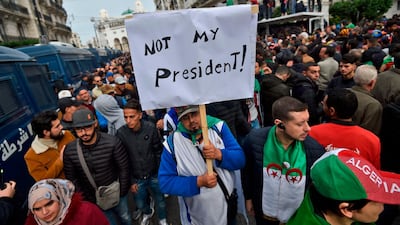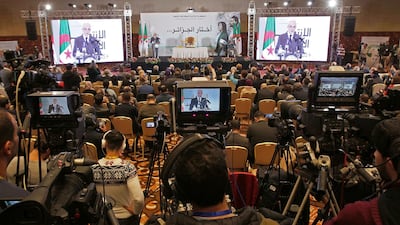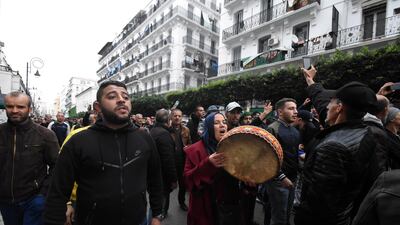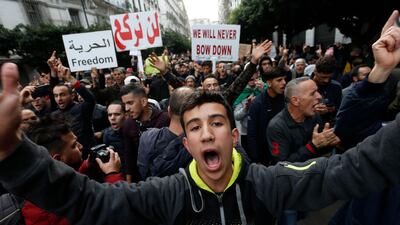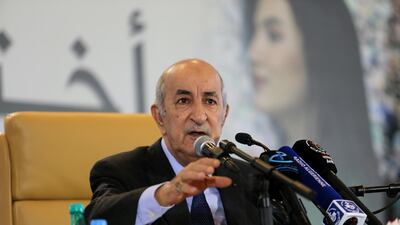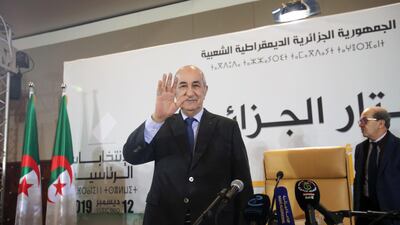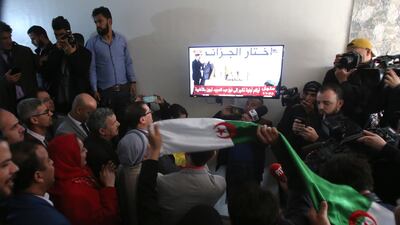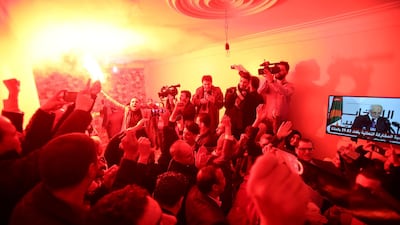A leading figure in Algeria’s ten-month-old protest movement has vowed the “revolution of smiles” will continue until it brings new democratic reform, despite the swearing in of the North African country’s first new leader in two decades on Thursday.
Newly-elected President Abdelmadjid Tebounne, who won the December 12 election with 58 per cent of a vote marked by a low turnout, previously said he will make it a priority to establish a “new Algeria” that addresses the demands of the protesters.
However, many took to the streets again on Friday to decry the election that brought him to power as “illegitimate”.
The Hirak – the protest movement named after the Arabic word for ‘movement’ – say they will not stop until the country undergoes significant political reform.
"We do not recognise these elections," Mustapha Bouchachi, a human rights lawyer and activist who is the unofficial figurehead of the movement, told The National at his office in downtown Algiers.
Speaking in English, which he honed while studying law at Southampton University in the UK, his composure reflects a calm determination and chants from protesters outside permeate the windows of his dark and old fashioned room as he talks.
“The majority of Algerians refuse these elections because they think it's the same system that will continue to govern this country.
“The people who nominated this president were not elected by the Algerians. He was chosen by ‘le pouvoir’ and these people don’t want democracy,” he said.
The Hirak called for a boycott of the election due to claims it was not transparent or fair, and now many say they reject the new president. They want to prevent what they see as a ploy by the political elite – who they refer to as ”le pouvoir” – to retain its hold on power.
Mr Tebounne succeeded Abdelaziz Bouteflika, who was president from 1999 until the protests forced him from office in April this year over his plans to stand for a fifth term. He is seen as close to armed forces chief Ahmed Gaid Salah, who has been the country's effective ruler since, and the role of president is considered by some to be the civilian face for military rule.
“But our revolution did not stop on December 12. We want a transition to real democracy, with civil society and political parties ... and this beautiful revolution, this peaceful revolution, this revolution of smiles will lead us there.
“Algerians are very determined and I am very proud. I’m very optimistic - we’re going to win,” he said, a sassy smile lighting up his eyes.
Mr Bouchachi, who is in his sixties, was the president of the Algerian League for Human Rights from 2007 to 2012, and gave legal support to many of those who were arbitrarily arrested during the country’s ten-year-long civil war that ended in 2002.
Between 2012 and 2014, he took a role in parliament as his “way of protesting”, but stepped down after he found he was still unable to affect change due to the lack of space to question the system.
With the memory of “le decade noir”, the bloody civil war in which around 200,000 people were killed, still fresh in the minds of Algerians, the Hirak are determined to press for the reforms they desire peacefully, and most of the rallies end at 6 pm to avoid escalation.
“Violence, we think, does not achieve democracy. Violence gives legitimacy to ‘le pouvoir’ [to retaliate] and they have the means of violence more than the people,” Mr Bouchachi said.
This way they are, he said, showing ‘le pouvoir’ “that they cannot carry on running the country like it's private property. It’s a strong message”.
While he is seen as a mentor to the protesters, Mr Bouchachi declines to be labelled the leader of the protest movement and says the country’s youth deserve all the credit.
“My generation tried in the 1990s to push for human rights and democracy. We talked to a lot of people in the West and in the region about our struggle but we didn't succeed as a generation,” he said.
“In the end. We lost everything. We destroyed our economy and didn't get democracy,” he said. “I will die peacefully if Algeria can eliminate this dictatorship.”


